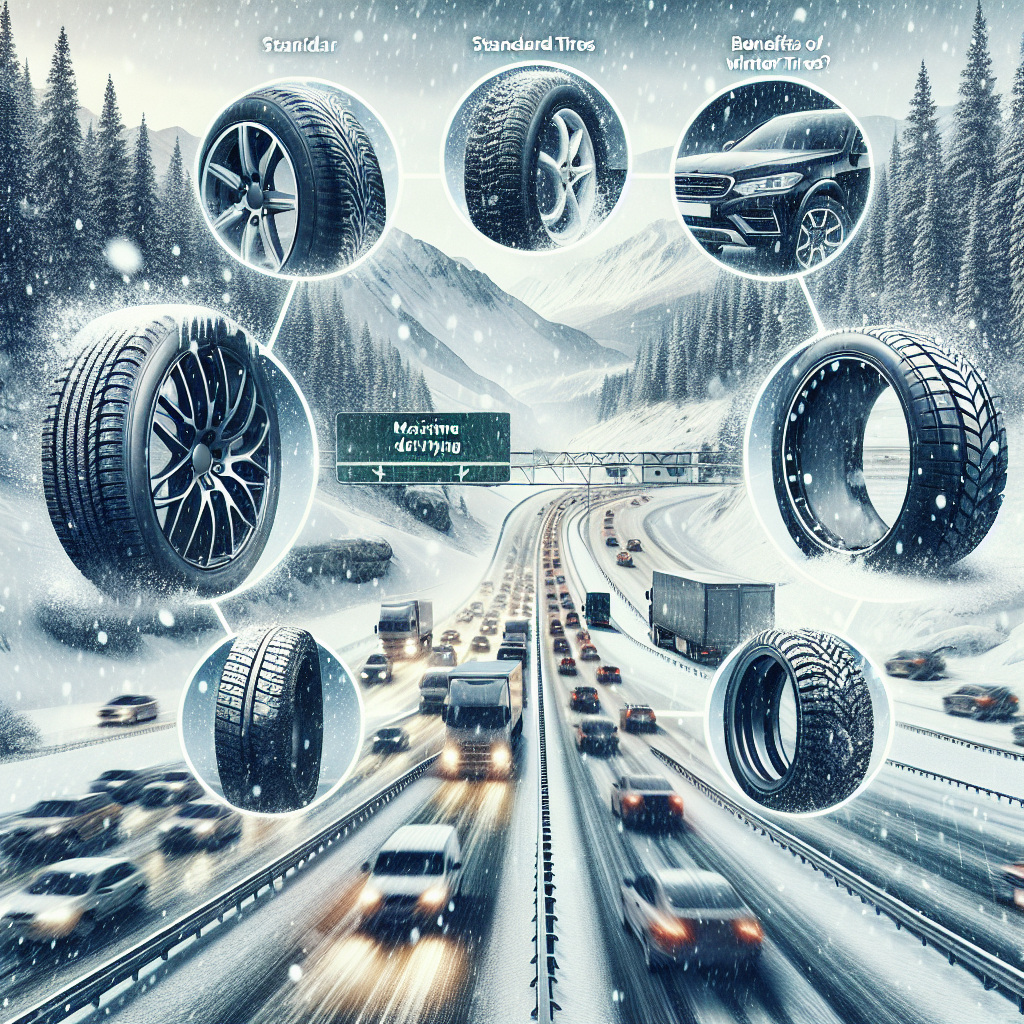As the frosty winds start to blow and snowflakes dance their way down from the sky, you might find yourself wondering – can winter tires really handle the demands of highways and higher speeds? Admittedly, it’s a question that often crosses the minds of many drivers when the weather takes a wintry turn. In this article, we will explore the capabilities and limitations of winter tires, shedding light on whether they can truly keep you safe when the roads become an icy playground.
Understanding Winter Tires
Winter tires are specifically designed to provide improved traction and handling in cold weather conditions. These tires have unique tread patterns that are optimized for better grip on snow and ice-covered roads. They are made with a softer rubber compound that remains more flexible and pliable in freezing temperatures. Winter tires also feature many sipes, which are thin slits in the tire tread that enhance traction and grip on slippery surfaces. These features make winter tires highly effective in severe winter conditions, but can they be used on highways and at higher speeds?
Winter Tires and Highway Driving
Winter tires are indeed suitable for highway driving and can be used at higher speeds. In fact, many winter tires are designed to perform well on highways and maintain their effectiveness even at increased speeds. However, it is important to understand some key factors and considerations before using winter tires on highways or driving at higher speeds.

Factors to Consider
When considering the use of winter tires on highways and at higher speeds, several factors should be taken into account. Firstly, the specific winter tire model and its intended usage should be examined. Some winter tires are designed for passenger vehicles, while others are optimized for SUVs or trucks. The load index and speed rating of the tire should also be considered to ensure they meet the requirements of highway driving.
Secondly, it is essential to assess the climate and weather conditions in your region. If you frequently encounter heavy snowfall, icy roads, or harsh winter conditions, investing in a set of winter tires would be beneficial. However, if you live in an area with mild winters or rarely experience snow or ice, all-season tires may suffice for highway driving.
Lastly, your driving habits and preferences play a significant role. If you tend to drive aggressively or at higher speeds on highways, it is crucial to choose winter tires with higher speed ratings to ensure optimal performance and safety.
Tire Speed Ratings
Tire speed ratings indicate the maximum speeds the tire can sustain for an extended period without compromising its performance. They are expressed as letters ranging from Q to Z, with each letter corresponding to a specific speed range. For example, S represents a speed rating of up to 112 mph, while V represents up to 149 mph. It is important to choose winter tires with a speed rating suitable for your desired highway speeds.

Winter Tires vs All-Season Tires
One common question that arises when considering winter tires for highway driving is whether they are better than all-season tires. All-season tires are designed to provide adequate performance in various weather conditions, including light snow and ice. While they offer versatility, they may not perform as well as dedicated winter tires in extreme winter conditions.
Winter tires, on the other hand, are specifically engineered for enhanced traction and control on snow and ice-covered roads. Their unique tread patterns and softer rubber compounds provide superior grip and handling in cold temperatures. If you frequently encounter severe winter conditions or desire optimal performance during the winter season, switching to winter tires for highway driving is highly recommended.
Performance of Winter Tires on Highways
Winter tires excel in snowy and icy conditions, but how do they perform on highways? Winter tires can provide excellent traction and control on highways, even at higher speeds. Their advanced tread patterns and rubber compounds ensure better gripping capabilities, allowing for improved braking and steering response. This can instill confidence and enhance safety when driving on cold, slippery highways.
One notable feature of winter tires is their ability to evacuate slush and water efficiently. This helps prevent hydroplaning and maintains better contact between the tire and the road surface, enhancing stability and control. As a result, winter tires can deliver reliable performance on highways, promoting a smooth and comfortable driving experience.

Benefits of Using Winter Tires on Highways
The use of winter tires on highways brings several benefits. One of the most significant advantages is the improved grip on snowy and icy roads. Winter tires’ tread patterns and softer rubber compounds significantly enhance traction, allowing for safer and more controlled driving on highways during winter months.
Additionally, winter tires can positively impact braking performance. They provide shorter stopping distances compared to all-season tires on slippery surfaces, reducing the risk of accidents and collisions. This can be particularly crucial on highways, where abrupt stops may be required due to high speeds and sudden road conditions.
Furthermore, the enhanced handling and stability of winter tires contribute to a smoother and more comfortable highway driving experience. Winter tires are designed to adapt to changing road conditions, ensuring optimal performance and control even in challenging winter environments. This can help alleviate stress and anxiety associated with winter driving, promoting a more relaxed and enjoyable journey.
Potential Risks and Limitations
While winter tires offer significant advantages, it is essential to be aware of certain limitations and potential risks when using them on highways. One limitation is the reduced tread life of winter tires compared to all-season tires. The softer rubber compound that provides enhanced traction wears out more quickly on dry and warm highway surfaces, leading to a shorter overall tire lifespan.
Another consideration is the increased road noise associated with some winter tire models. The aggressive tread patterns and unique features that make winter tires effective in snowy conditions may result in louder road noise during highway driving. However, this can vary depending on the specific tire brand and model, so it is advisable to research and choose winter tires with quieter performance if road noise is a concern.
Ultimately, the decision to use winter tires on highways should be based on an understanding of these potential limitations and risks. Regular tire maintenance, including proper inflation and rotation, can help mitigate some concerns and maximize the lifespan and performance of winter tires.

Selecting the Right Winter Tires
Choosing the right winter tires for highway driving involves considering specific factors. Firstly, ensure that the winter tires meet the recommended load index for your vehicle, considering the weight it carries. Additionally, select winter tires with an appropriate speed rating suitable for your desired highway speeds.
Next, pay attention to the design and features of the winter tires. Look for models that offer superior traction on both snow and ice, as well as excellent stability and control. Reading customer reviews and consulting with tire professionals can provide valuable insights into the performance and reliability of different winter tire options.
Lastly, consider the climate and driving conditions that you typically encounter on highways. If you live in an area with frequent heavy snowfall or icy roads, prioritize winter tires with a more aggressive tread pattern and outstanding snow traction. For regions with milder winters, all-season tires with a snowflake symbol (indicating their winter performance capabilities) may be adequate for highway driving.
Tips for Safe Winter Driving with Winter Tires
To ensure a safe and enjoyable winter driving experience on highways with winter tires, it is crucial to follow some essential tips:
-
Maintain proper tire inflation: Underinflated tires can negatively impact traction and handling, so regularly check the tire pressure to ensure optimal performance.
-
Drive at a safe speed: While winter tires provide enhanced grip, it is still necessary to adjust your driving speed according to the road conditions. Reduce speed and maintain a safe distance to account for potential hazards and reduced visibility.
-
Allow for longer braking distances: Although winter tires improve braking performance, it is important to remember that stopping distances are still longer on snowy and icy surfaces. Increase the distance between your vehicle and the one in front to allow for safer braking.
-
Pay attention to changing weather conditions: Winter weather can be unpredictable, so stay aware of any changes in road conditions or weather forecasts. Adjust your driving style and speed accordingly to adapt to any challenges.
-
Regularly inspect your tires: Monitor the tread depth and overall condition of your winter tires. Worn-out or damaged tires can compromise performance and safety.
By following these tips and using winter tires appropriately, you can confidently navigate highways during the winter season while enjoying the benefits of enhanced traction and control. Remember, safety should always be the top priority when driving in winter conditions, and using winter tires is an essential step towards ensuring a safer journey.


